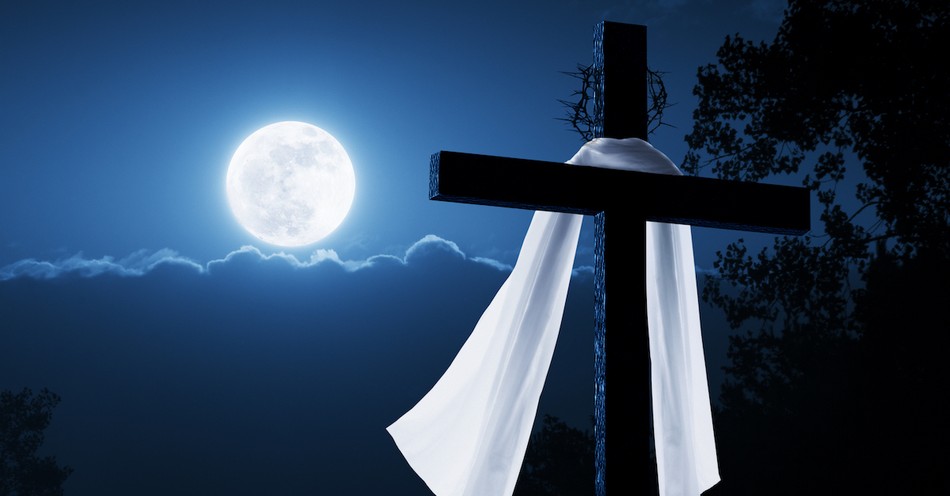Matthew Y. Emerson states that we focus a great deal on Christ’s crucifixion and resurrection when we talk about salvation because they are rightly central; however, “what is often omitted from our understanding of the Triduum, the three days of Christ’s Passion”, is Saturday. That is, we miss the day in between. We can argue that the reason for this omission is that so little is said of Holy Saturday in Scripture, and we do not want to put words in the mouth of God. It is important that nothing be added or taken away from his inspired Word. (Revelation 22:18-19) We can imagine the anguish, even disbelief, of the Apostles and followers, but where did Jesus go? What can we discern from Scripture about the events of Holy Saturday?
Did Jesus Go to Hell?
While almost every leader of every Christian church agrees that Jesus died and was interred in a borrowed tomb, scholars do not agree as to where he went before he was resurrected. Did Jesus enter a “soul sleep” as some call it? Did he go to Hell, to Heaven, or to a waiting place?
Emerson argues that, since Jesus was fully man, he went where fully human men would go. He believes that Scripture describes “an intermediate state and that Jesus experienced it as all humans do.” This was known as Sheol or Hades which is not the same as Hell and where there would be two areas: one for believers, one for unbelievers.
Joe Rigney describes Hell as separate from Hades. The wicked dwell “in Hades in torment, until the final judgment, when Hades gives up the dead who dwell there, and they are judged according to their deeds, and then Death and Hades are thrown into hell, into the lake of fire”. Jesus did not go here.
“In Matthew 12:40, Jesus draws a direct analogy between Jonah’s experience in the belly of the fish and his own coming time in the tomb,” Emerson wrote. Jesus equated this to being with the dead.” In this verse, Jesus explains: “just as Jonah was three days and three nights in the belly of the great fish, so will the Son of Man be three days and three nights in the heart of the earth.” He is referring to death, the waiting room where all people go until Christ returns to judge the wicked and the righteous.
Jesus revealed his destination more fully to the thief on the cross who needed in that desperate moment the same hope that Jesus leaned on in his agonized state. “Truly, I say to you, today you will be with me in paradise.” (Luke 23:43) According to Jesus, he would spend Saturday with the souls of deceased believers awaiting their bodily resurrection.
We learn from this that the soul and body are disconnected at death. Upon Christ’s return, bodies and souls are reunited for eternity in Hell or in Heaven.
Did Jesus Preach on Saturday?
Guy Waters, however, believes Old Testament saints were already with the Father. Whom, then, was Jesus preaching to in 1 Peter 3:19? It appears that Jesus “went and proclaimed to the spirits in prison, because they formerly did not obey”. Does this mean Jesus preached the Gospel to those who had died without having submitted to the Lord as their King, giving them a second chance at redemption, or even condemning them? Was he collecting the Old Testament Saints in order to take them with him to Heaven? Waters explains that, although scholars disagree about what Jesus did, “they see Jesus doing something.”
Waters believes that Peter is saying Christ had been at work for a long time by his Holy Spirit, through Noah (and, arguably, other prophets), preaching repentance before the wicked were condemned (at the flood, for example). “Noah, in the course of building the ark, bore testimony to the coming judgment of God.” So, when Peter says “God's patience waited in the days of Noah,” (v.20) he is talking about the Holy Spirit. By extension, every time a prophet preached repentance, the Holy Spirit was at work.
Waters uses the Parable of Lazarus and the Rich Man in Luke 16 as his touchstone to argue that, “at their deaths, the souls of Old Testament believers went immediately into the presence of God.” He did not need to go and release those who had died in faith. “The poor man died and was carried by the angels to Abraham's side. The rich man also died and was buried, and in Hades, being in torment, he lifted up his eyes and saw Abraham far off and Lazarus at his side”. (Luke 16:22-23) These two men went instantly to Heaven and Hell, respectively. Says Waters, there would have been no reason for Jesus to preach in Paradise: “The final judgment, after all, will take into account only what one has done in this life, not anything done in the hereafter”.
For those who had died apart from Christ, it was already too late for them. He had no reason to confirm his Sovereign victory over death to those who were separated from God forever, or the realities of Hell would suffice. Even if we refer to Revelation 20:5, which talks about the first resurrection, it is still difficult to argue that Christ would preach to those who had died without submitting to the Father.
What Were the Disciples Doing?
The disciples, shocked by events, entered into the Sabbath immediately following Jesus’ death, which was Saturday according to Jewish teaching. Garrit Scott Dawson laments that, during Easter, we no longer seem to take Saturday to reflect on what it means to wait for the Lord, being so eager to get on with the joyful celebration of Easter Sunday. “The Father did not raise Jesus directly from the cross. There was a day in between. A pause. A spacer. At the center of the earliest summary of the gospel, there sits the silence of Holy Saturday.” Little is written because little was done. What were the disciples doing at this point?
They waited: Jesus’ followers “could not finish tending Jesus’s body for entombment [...]. They felt an incompleteness. Surely they experienced on Saturday feelings similar to those described on Sunday before the truth of Jesus’s resurrection fully dawned on them.” The disciples were asking what just happened? What do we do now? They had given up their old lives, and now they tried to “make sense of the shock”, even though Jesus had told them several times that he would die and be raised, but not until the third day. They experienced the grief we feel when we lose someone whom we expect to see in Heaven with the Lord one day. That joy is coming, but grief is still real. The disbelief is still palpable. For those who try to see that day from the disciples’ perspective, it is natural to spend a bit of time considering “the reality of this dreadful interval before hope returned.” And when we spend time like this, allowing ourselves to feel the weight of that grief, Easter is all the more joyful as a result.
But for the disciples, who had given up their former lives, a great deal was at stake. How could they forge ahead and proclaim the good news of a dead Savior? Their lives were dangerous now. If they could not somehow get out of Jerusalem unseen, the eleven remaining friends of Jesus might face the same fate. One day of waiting seems short by comparison with 2,000 years of waiting, but that day was full of uncertainty.
Encouragement for Believers
After so long, some lose hope for a time, feel discouraged, even wander away from God. Many will see Holy Saturday as a day to truly reflect on the cost of our sin and the void we would feel without Jesus in our lives, or to imagine the anguish and confusion of the Apostles who did not yet understand what Jesus had been teaching them. But the very fact of Holy Saturday encourages us to remember that the wait will not go on forever. Christ kept his promise then, and he will keep it today. He has sympathy with our human failings, even offering Thomas, who had walked with Jesus and seen his miracles, the holes in his hands so he could realize the truth: that this was his Savior. (John 20:27) Christ was raised. He WILL come again. During this time, we can encourage one another to consider what Jesus said as recorded in John 14: “If you love me, you will keep my commandments. And I will ask the Father, and he will give you another Helper, to be with you forever, even the Spirit of truth [...]. I will not leave you as orphans; I will come to you.” (vv.15-19)
Sources: https://www.desiringgod.org/articles/the-day-jesus-stayed-dead
https://www.logos.com/grow/hall-holy-saturday-what-happened-jesus-died/
https://www.desiringgod.org/articles/he-descended-into-hell
https://www.thegospelcoalition.org/article/does-1-peter-teach-jesus-preached-hell/
Photo Credit: Getty Images/iStock/ricardoreitmeyer




